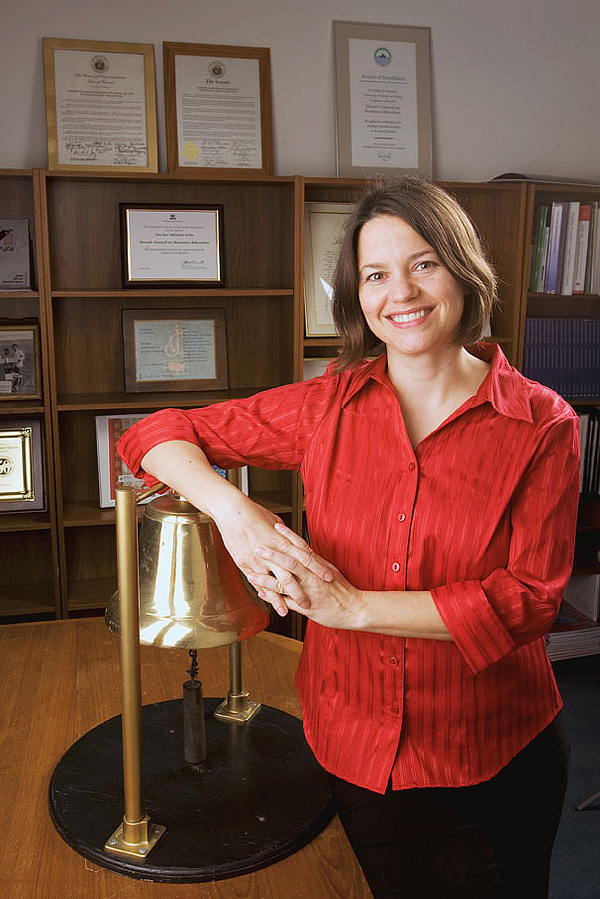Alumni Gazette
 BANK ON IT: As director of a Honolulu-based nonprofit, Castagnaro helps kids as well as adults learn to make good financial decisions. (Photo: AP Images for Rochester Review)
BANK ON IT: As director of a Honolulu-based nonprofit, Castagnaro helps kids as well as adults learn to make good financial decisions. (Photo: AP Images for Rochester Review)It seems simple enough: Teens who are getting credit card solicitations should know the meaning of compound interest.
But many don’t, says Kristine Krause Castagnaro ’92, executive director of the financial literacy nonprofit organization, the Hawaii Council on Economic Education. And neither, sometimes, do the adults around them.
“Often people are not prepared to make financial decisions,” says Castagnaro, who majored in economics at Rochester. The American economy has developed in ways that make borrowing and investing both more necessary and more complex than in the past. Yet very few schools teach economic literacy.
Confusion extends to many areas of personal finance, including gauging how much home you can afford, knowing how to take advantage of employer or government benefits, or realizing why the earlier you save, the better (again, think compound interest).
As director of the council for the past seven years, Castagnaro says the nonprofit has grown from “a little bitty struggling organization to a thriving place.” She and her staff of two, with the support of an active board of directors and a growing list of private and public partners, have created workshops for K-12 teachers, statewide contests for students, and a Na Wai Puapua i (“Care for the Future”) K-12 curriculum that links financial literacy to native Hawaiian culture.
Leisha Bento, a high school social studies teacher, met Castagnaro through a college instructor. Bento had already incorporated economic concepts into her classes on world history. But with knowledge gained from a council workshop, she created an entire course in economics. “It really helped me with the pedagogy part—with how to teach economic concepts,” Bento says.
Castagnaro stresses that economic concepts can be taught at any age. Take, for example, opportunity cost, which is “the most valuable alternative you give up when you make a decision,” she says. “With kids, you can talk about that in terms of selecting a candy bar.” For teens, who are better equipped to understand the future consequences of decision making, the discussion might be about whether to hang out with friends or do your homework, she adds.
Castagnaro says the organization would like to see every high school student in Hawaii graduate with a course in economics. Yet reaching everyone is a challenge. Hawaii, like most states, does not require students to take economics or personal finance. “Teachers have an uphill battle,” says Castagnaro.
Over the past few years, the council has branched out to form alliances with banks and insurance companies that have an interest in reaching adults at various life stages who are in the midst of making major financial decisions. This past summer, the council organized a statewide 2009 Personal Finance Expo, in which over 80 exhibitors offered free seminars such as “Reverse Mortgage Basics” and “Money & Mom: Handling Your Parents’ Finances as they Age.”
Castagnaro and her husband, Russell, a computer consultant, met in Atlanta and were seeking a new adventure. After a plan to live and work in New Zealand fell through, they decided to settle in Honolulu, where the couple now lives with their two young daughters. Castagnaro had been working on special events for the March of Dimes when she met David McClain, the dean of the business school at the University of Hawaii, and the chairman of the council’s board of trustees.
“Kristine is a self-starter, remarkably creative and an out-of-the-box thinker,” says McClain, now the president emeritus of the University of Hawaii system. “She is able to bring people together from a wide variety of professions and from all ages, and to catalyze their energies in support of a common goal.”
For now, that goal is to continue expanding the Council’s services, its reach, and, Castagnaro adds, planning for another, even larger expo in 2011.

